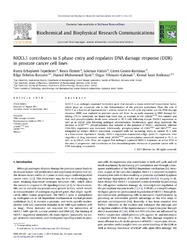Please use this identifier to cite or link to this item:
https://hdl.handle.net/11147/4938| Title: | Nkx3.1 Contributes To S Phase Entry and Regulates Dna Damage Response (ddr) in Prostate Cancer Cell Lines | Authors: | Erbaykent Tepedelen, Burcu Özmen, Besra Varışlı, Lokman Gönen Korkmaz, Ceren Debeleç Bütüner, Bilge Hamid, Syed Muhammad Çakmak, Özgür Yılmazer Korkmaz, Kemal Sami |
Keywords: | NKX3.1 PATM (S1981) Prostate cancer Topoisomerase inhibitor CPT-11 DNA damage response γH2AX (S139) foci |
Publisher: | Academic Press Inc. | Source: | Erbaykent-Tepedelen, B., Özmen, B., Varışlı, L., Gönen-Korkmaz, C., Debeleç-Bütüner, B., Hamid, S. M., Çakmak, Ö. Y., and Korkmaz, K. S. (2011). NKX3.1 contributes to S phase entry and regulates DNA damage response (DDR) in prostate cancer cell lines. Biochemical and Biophysical Research Communications, 414(1), 123-128. doi:10.1016/j.bbrc.2011.09.035 | Abstract: | NKX3.1 is an androgen-regulated homeobox gene that encodes a tissue-restricted transcription factor, which plays an important role in the differentiation of the prostate epithelium. Thus, the role of NKX3.1 as a functional topoisomerase I activity enhancer in cell cycle regulation and the DNA damage response (DDR) was explored in prostate cancer cell lines. As an early response to DNA damage following CPT-11 treatment, we found that there was an increase in the γH2AX (S139) foci number and that total phosphorylation levels were reduced in PC-3 cells following ectopic NKX3.1 expression as well as in LNCaP cells following androgen administration. Furthermore, upon drug treatment, the increase in ATM (S1981) phosphorylation was reduced in the presence of NKX3.1 expression, whereas DNA-PKcs expression was increased. Additionally, phosphorylation of CHK2 (T68) and NBS1 (S343) was abrogated by ectopic NKX3.1 expression, compared with the increasing levels in control PC-3 cells in a time-course experiment. Finally, NKX3.1 expression maintained a high cyclin D1 expression level regardless of drug treatment, while total γH2AX (S139) phosphorylation remained depleted in PC-3, as well as in LNCaP, cells. Thus, we suggest that androgen regulated NKX3.1 maintains an active DDR at the intra S progression and contributes to the chemotherapeutic resistance of prostate cancer cells to DNA damaging compounds. | URI: | http://doi.org/10.1016/j.bbrc.2011.09.035 http://hdl.handle.net/11147/4938 |
ISSN: | 0006-291X 0006-291X |
| Appears in Collections: | IZTECH Research Centers Collection / İYTE Araştırma Merkezleri Koleksiyonu PubMed İndeksli Yayınlar Koleksiyonu / PubMed Indexed Publications Collection Scopus İndeksli Yayınlar Koleksiyonu / Scopus Indexed Publications Collection WoS İndeksli Yayınlar Koleksiyonu / WoS Indexed Publications Collection |
Show full item record
CORE Recommender
SCOPUSTM
Citations
8
checked on May 16, 2025
WEB OF SCIENCETM
Citations
8
checked on Jun 27, 2025
Page view(s)
394
checked on Jun 10, 2025
Download(s)
486
checked on Jun 10, 2025
Google ScholarTM
Check
Altmetric
Items in GCRIS Repository are protected by copyright, with all rights reserved, unless otherwise indicated.
